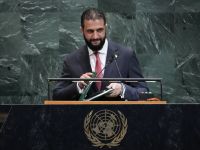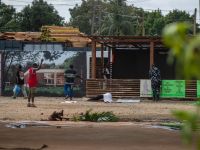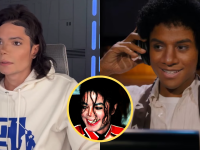Violence threatening the Middle East peace process loomed large Monday as White House rivals Al Gore and George W. Bush geared up for their third and final debate, hoping to break their deadlocked race 22 days before the election.
With President Bill Clinton attending a summit in Egypt aimed at restoring calm in Israel and the Palestinian territories, Gore and Bush tread gingerly in public statements about the crisis as they strode towards their last televised 90-minute showdown in St. Louis, Missouri, at 9 p.m. Tuesday (0100 GMT Wednesday).
"The governor hopes that the summit will be a success. It has been important to him that we speak with one voice. He's talked about support for the president this time and he certainly hopes he can bring calm," Condoleezza Rice, Bush's national security advisor, told CBS Monday.
Analysts were unusually reticent to say whether the Democratic vice president or Texas governor stood to reap more political gain from the unrest, which has claimed some 109 lives since September 28.
Voters unhappy with Washington's course of action may gravitate towards Bush, but citizens could just as well see the vice president's quarter-century of foreign policy experience as a decisive asset, experts say.
Going into their final exchange, Gore faces the greater challenge: despite his much-vaunted debate savvy and encyclopedic mastery of policy details, national opinion polls show him trailing Bush by a handful of percentage points after their first two one-on-one encounters.
The vice president weathered criticism that he was overbearing in the first debate and overly muted in the second, while Bush -- for whom the debates had been seen as a liability -- has won good reviews for not floundering and making the most of his folksy charm.
But with the Republican standard-bearer's lead within the surveys' margin of error, both camps acknowledge the race is still up for grabs.
"We feel the race has been close and that it will be close until election day," November 7, according to Gore campaign spokesman Dag Vega.
And Gore stands to benefit more from a "town hall" format -- in which the candidates will take questions from an audience -- to which he has grown familiar over hundreds of similar encounters throughout his career in public life.
"We're happy to have the vice president on stage in this format to highlight his agenda for working families," added Vega, referring to Gore's populist promise to "fight for the people, not the powerful."
Gore was in St Louis preparing with a dozen of what his campaign has called "citizen advisors," all of them from Missouri, and running the usual mock-debates with a stand-in for the Texas governor, said Vega.
Bush prepared for the encounter at his Texas ranch before heading through Clinton's home state of Arkansas and then on to St. Louis.
Both candidates were to pursue efforts to woo undecided and independent voters and barnstorm key battleground states that will decide what analysts say could be the tightest US presidential race in four decades.
Already, Gore was stepping up attacks on Bush's record in Texas, targeting his handling of issues atop voters' agendas such as health care and education.
Meanwhile, Bush launched an effort to woo women voters, who tend to favor the Democratic candidate, and dispatched 29 of the nation's 30 Republican governors to toss-up states -- WASHINGTON (AFP)
© 2000 Al Bawaba (www.albawaba.com)







